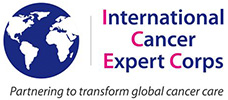Overview
The underlying principle of ICEC is to establish a sustainable corps of experts who have sufficient time and resources to provide mentorship to healthcare workers within an underserved community so that over a mutually developed timeline the team in the lower-middle income facility can provide the full spectrum of cancer care at international standards.
July 2017
ICEC is working in two closely related pathways, mentoring and innovation in the application of technology, illustrated in two slides (below) from a presentation at the ICARO2 meeting in Vienna in June 2017.
Sustainable Mentoring
The first pathway, (figure 1.) is the sustainable mentoring network including a career path so that programs in underserved communities that are established and can progress to become regional and global leaders in oncology care. Plans, metrics, assessment of progress and deliverables are now essential to validate investment of resources and for success with grants, foundations and supporters. The “5- Step Plan” (figure 2.) will be piloted in a few of our “twinning projects. A twinning project is a collaborative relationship between a university department or cancer program (or private practice) in an upper-income country (an ICEC Hub with ICEC Experts) and a cancer program/facility in a low- or middle-income country (an ICEC Center with ICEC Associates). This capacity building strategy facilitates the creation a sustainable platform for the sharing of best practices and learnings from each other through information and technology transfer. The ultimate aim is for the ICEC Centers and Associates to progress to become ICEC Hubs and Associates for their regions.
Technology Innovation
The need for robust, first-rate radiation treatment systems capable of functioning in the challenging environments encountered in many developing countries is another well recognized global need. ICEC’s program that addresses this challenge is the second arrow in figure 1. This topic was the subject of an ICEC-sponsored, CERN-hosted workshop held at CERN in November 2016. An overview of the workshop is available on our website and in the CERN Courier. Publication of a detailed report of the workshop is under review.
The idea for the workshop arose from the International Conference on Translational Research in Radio-oncology & Physics for Health in Europe (ICTR-PHE) in 2014. The idea was revisited again in the 2016 ICTR-PHE meeting which led to ICEC’s sponsoring and CERN’s hosting the referenced workshop. Seventy participants representing universities, governments, international organizations, industry, NGOs and nuclear non-proliferation groups attended the workshop. The deliberations over two days led to the formation of three Task Forces, each of which had three conference calls before June 2017:
- Task Force 1 – Technical (“Bury the complexity”)
- Task Force 2 – Education, Training and Mentoring
- Task Force 3 – Global Connectivity and Development
In an open ICEC meeting during the ICARO2 conference in Vienna in June 2017, members of each task force summarized their planning to date and plans for the immediate future. To further explore technology innovation, ICEC’s Task Force 1 will co-sponsor with the UK Science and Technology Financing Council (STFC) a workshop to be hosted by CERN in October 2017.
Photo: ICEC-sponsored, CERN-hosted Workshop Attendees, November 2016



